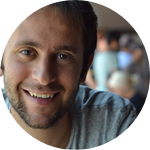About This Project
Ask the Scientists
Join The DiscussionWhat is the context of this research?
Electric propulsion is a reliable technology that provides highly efficient and controllable thrust for satellites. However, a large range of space missions require a much higher total thrust. Our final goal is to build a system able to deliver one hundred times the propulsive force of traditional electric technology while keeping it controllable and efficient.
In our laboratory we work with a technology called colloid thrusters. We have successfully miniaturized one of these; our next step is to fabricate an array of 81 thrusters that are reliable, small and light enough to be used in a microsatellite.
What is the significance of this project?
Space technology is evolving towards smaller and lighter satellites. In the near future we will see swarms of satellites flying in formation while collaborating between them to fulfill their missions.
The small total thrust output provided by colloid thrusters makes them the ideal choice to control the upcoming generation of micro, nano and picosatellites but limits their use to missions with small propulsive requirements. Current technological alternatives that provide high thrust are too bulky, heavy or difficult to control.
Microfabricated arrays of colloid thrusters are small and light enough to fit on a penny; they will provide controllable, efficient and powerful thrust enabling future formations of spacecraft to go faster and further away opening the door to cheaper communications and a better understanding of our planet and solar system.
What are the goals of the project?
The collected funds will be used for materials purchase, travel expenses and the use of the INRF (UCI) and Nanolab (UCLA) cleanrooms. Cleanrooms provide a controlled environment, free of dust and particles in suspension; this is an essential requirement to build the microscopic array of thrusters for my research.
Cleanroom fees are the major expense of the project and include the usage of the equipment necessary to transfer the desired geometries into a silicon wafer. Some of the machinery used are DRIE (Deep Reactive Ion Etcher), RIE, Mask aligners and SEM (Scanning Electron Microsope)
Budget
Material purchase: Silicon wafers, beakers, photoresist, tweezers, containers etc.
Travel expenses to UCLA cleanroom
INRF and Nanolab use expenses
Meet the Team
Affiliates
Mechanical Engineering (5 year degree), Barcelona Tech - Universitat Politecnica de Catalunya
Masters in Aerospace Engineering, University of Padua (Italy)
Team Bio
Born and raised in Barcelona (Catalonia) I have been living in California for the last 4 years.Before arriving to the USA I obtained a TIME (Top Industrial Management for Europe) double degree in Mechanical and Aerospace Engineering from Barcelona Tech (UPC-Catalonia) and the University of Padua (Italy). From 2009 to 2012 I have been recipient of the Balsells Fellowship to pursue my doctoral studies at the University of California Irvine.
Enric Grustan
Born and raised in Barcelona (Catalonia) I have been living in California for the last 4 years.
Before arriving to the USA I obtained a TIME (Top Industrial Management for Europe) double degree in Mechanical and Aerospace Engineering from Barcelona Tech (UPC-Catalonia) and the University of Padua (Italy). From 2009 to 2012 I have been recipient of the Balsells Fellowship to pursue my doctoral studies at the University of California Irvine.
Additional Information
ContactIf you have any questions, please contact me here
Credits
Banner picture - Analytical Mechanics Associates
Press and Media:
Project Backers
- 26Backers
- 32%Funded
- $1,280Total Donations
- $49.23Average Donation

